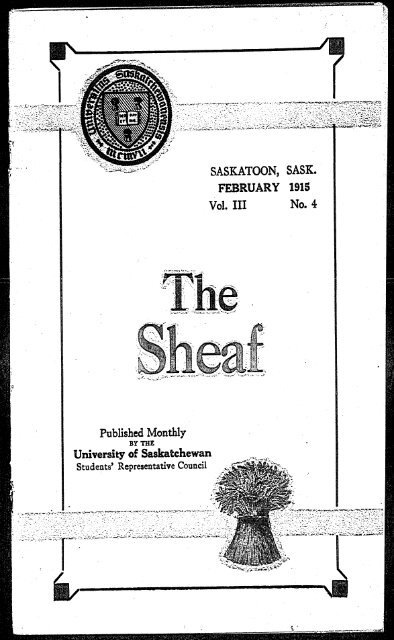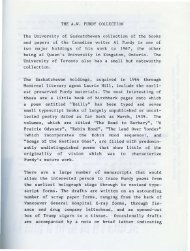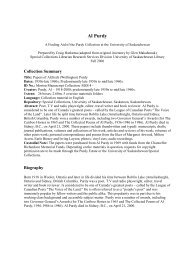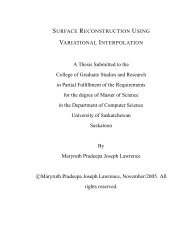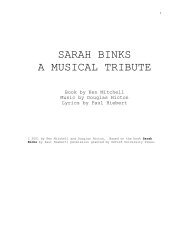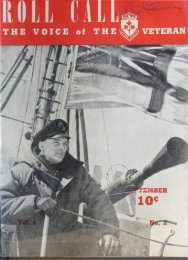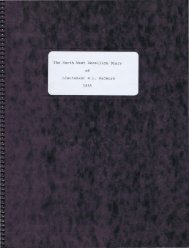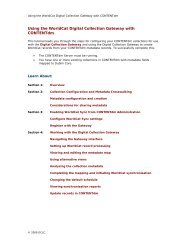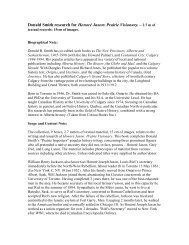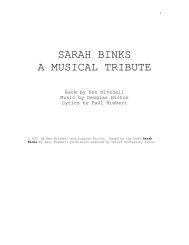c - Library2 - University of Saskatchewan
c - Library2 - University of Saskatchewan
c - Library2 - University of Saskatchewan
You also want an ePaper? Increase the reach of your titles
YUMPU automatically turns print PDFs into web optimized ePapers that Google loves.
"C _~~'::'25 ~~,~--" c;:-c~~,:{~~22i-~fli~i~~ft~I:i~'~~.; ''',~''''''''''~~~'''':''''''':'~ .. ~''''':';,~:~'~:~~ :'"";~.'~'''~>~ .. ~,..-: ~': '·':~r'~';,~~,~..,Il~~~'Jf~,.,e~r:-~~'~~;~·"~~~;~SASKATOON, SASK.FEBRUARY 1915Vol. III No. 4Published MonthlyBYTBE<strong>University</strong> <strong>of</strong> <strong>Saskatchewan</strong>Students' Representative Council. '~'~'7c'~':-:~~':;'~J.~'~::>"~",":" .... /,.~~:~~,-.-··~:.~,-~" ~ .• ~ '~7"~':C(:-"~~"~'-' .. ,' " ~ '".. - . ~ .. ~..• ~ ,;. ~.' c./ ,~,;i~:;;~0~{~;~&ij1&l~
116 THE SHEAFor "Chant <strong>of</strong> Hate." It is hard to credit the report thatEmperor William has conferred the highest decoration <strong>of</strong> theOrder <strong>of</strong> the Red Eagle ,<strong>of</strong> the Fourth Clags upon the manwho wrote:"You will we ha te with a lasting hate,We will never forego our hate,Hate by water and hate by land,Hate <strong>of</strong> the head and hate <strong>of</strong> the hand,Hate <strong>of</strong> the hammer and hate <strong>of</strong> the crown,Hate <strong>of</strong> seventy millions choking down.\Ve love as one, we hate as one,We have one foe and one alone-ENGLAND."If that chant is the true expression <strong>of</strong> the Ge~man's attitudetoward his foe, it may perhaps be said in her defence thatan inhuman war machine has prostituted the talent <strong>of</strong> hishighest educators to the propagation <strong>of</strong> such a spirit. OurBritish pride is well and happily founde~ in the flower <strong>of</strong> anatural sentiment and a noble patriotism., Britain bestowsher honors quite othenvise. Let Sir Henry Newbolt expressthe spirit <strong>of</strong> our warriors:"To set the cause above renown,To love the game beyond the ,prize,To honor, whil,e you strike him downThe foe that comes with fearless eyes;To count the life <strong>of</strong> battle good,And dear the land that gave you birth,And dearer yet the brotherhoodThat binds the brave <strong>of</strong> all the ~arth."When it comes to a fight, which makes the better warrior?To William \Vatson our thanks are due for condemningsplendidly in one line the sacriligeous attitude which formsthe greatest stain on the character <strong>of</strong> a mad War Lord. ThankGod "Vole are not on such easy terms with heaven."The fine <strong>of</strong>fer <strong>of</strong> President Murray to stand sponsor forthe students <strong>of</strong> this university in so far as it is possible forTHE SHEAF 117him to go when we get into difficulties with the public is onewhich every student will applaud. May the need not arise,.too <strong>of</strong>ten!Perha~s we may be permitted to express mild surprisethat Toronto and Ottawa universities should require a hintfrom the Federal Government to make them see the unwisdom<strong>of</strong> debating the relative menaces <strong>of</strong> Pan-Slavism andPan-Germanism at a time like the present.~bt ~inutt .atIT is a strife with little beings but infinitely more important,, more deadly and lasting than any man-made conflict, notexcepting Kaiser Wilhelm's epoch-making red one. It isthe war <strong>of</strong> King Bacteria! His battlefield is all <strong>of</strong> God's goodearth, his victims untold millions <strong>of</strong> men and animals who havedied prematurely all down through the ages following theDawn <strong>of</strong> Life. His armies are composed <strong>of</strong> hosts <strong>of</strong> minuteorganisms, <strong>of</strong> many races, but all effective, whether in destructionor constrnction. Their weapons are their ownbodies and their ammunition deadly poisons, or toxins. Theyalways fight at close range; they are the originators <strong>of</strong> everycontagious disease and for them the tiniest scratch is a strategicpoint <strong>of</strong> attack. \Vhen they ride forth to battle theirmotors are everything concrete, their aeroplanes and theirsubmarines are dust and fragments <strong>of</strong> animal and vegetableorgamsms.For millions <strong>of</strong> years they carried on a hopelessly unequalconflict with man before he even dreamed <strong>of</strong> their existence.Yet in the most remote annals <strong>of</strong> history are records <strong>of</strong> hisprimitive fight with the unknown, unseen foe. The laving<strong>of</strong> water, searing with hot iron, isolation <strong>of</strong> living victims, andsummary dissolution <strong>of</strong> the dead were some <strong>of</strong> his rough buteffective methods <strong>of</strong> combat. And in t~me he became wonderfullywise in the use <strong>of</strong> herbs, ointments and salts. Yethow <strong>of</strong>ten he found them less potent than the witch's charmbecause <strong>of</strong> his ignorance <strong>of</strong> cause and effect! And because
118 THE SHEAF<strong>of</strong> his blindness he was kept in continual dread <strong>of</strong> thosemighty pestilences recorded with insistent regularity on the'pages <strong>of</strong> life's story. Most imperfectly do we know <strong>of</strong> thenumbers <strong>of</strong> our progenitors who succumbed to that dreaddisease <strong>of</strong> Oriental origin, the Bubonic Plague, which in oneoutbreak in' Europe in the fourteenth century destroyedtwenty-five million humans. And yet it was just twenty-oneyears ago that the Japanese Kitasato discovered B. Pestisthe 'fiendish little rod-like organism whose dim~nsions hemeasured in thousandths <strong>of</strong> an inch.The history <strong>of</strong> cholera is similar. ,Koch first identifiedthe spiral-shaped germ while doing research work duringan outbreak in 1883. Later in 1892 nearly four hundredthousand died in Europe from the same disease, which wasactually traced to its origin in .the East. It came quickly ondivers carriers, but the unfiltered water <strong>of</strong> rivers spread,death most rapidly. Diptheria however; thrives best indrouth, in America more than in Europe. The death'ratein New York per year averages from one'to two per thousand.In Saskatoon the rate is nil, owing to an efficient HealthDepartment and an educated people.Typhoid is notable for its frequent outbreaks in manyplaces, the origin <strong>of</strong> its bacilli generally impure water. Itsravages are being widely checked by methods <strong>of</strong> prevention.Lord Kitchener, interested in this minute war as well asin others, predicted in 1910 that typhoid would before longjoin cholera in banishment from the barracks.The bacillus <strong>of</strong> tuberculosis, the ,most dread disease <strong>of</strong>today, was unearthed by Koch in 1882. "Do not spit onsidewalks," is the 'world-wide warning against the spread<strong>of</strong> its most virulent form. The question <strong>of</strong> the disease beinginherited is now an open one. "I. dispute this heredityabsolutely," are the words <strong>of</strong> Virchow, a famous scientist,uttered sixteen years ago.The history o~ man's discovery <strong>of</strong> bacteria dates from1675, when Leeuwenhoek, a Hollander, first saw them withthe aid <strong>of</strong> his compound lenses. But it' is very doubtfulwhether the Dutch scientist recognised the animalcules, as,1\:.'.:.:.':"",:,,:'
120 THE SHEAFwounds and their passage into the blood channels. Todaythousands <strong>of</strong> nurses and doctors are arresting the invadinghosts on the battlefields <strong>of</strong> Europe with bucketfuls <strong>of</strong> modernchemical antiseptics. .Nlodern Bacteriology was established by the Germanscientist Robert Koch. Koch isolated the anthrax bacillusin 1872. He invented entirely new methods <strong>of</strong> growth anddifferentiation <strong>of</strong> the different kinds <strong>of</strong> bacteria by.the use<strong>of</strong> solid culture media such as gelatine. He adopted the use<strong>of</strong> aniline dyes in staining bacteria for examination underpowerful misroscopes. Koch introduced a new method <strong>of</strong>identification, the inoculation <strong>of</strong> animals-the rodent andguinea pig-\vith bacteria ta~en from man. Today thereare a thousand Kochs at work along similar lines <strong>of</strong> investigation.The new science has brought into being a host <strong>of</strong>new words, mechanical appliances and specific chemicalreagents. The bacteriologist <strong>of</strong> today is not so much anidealist as a worker. \Vith head and hands, <strong>of</strong>ten with. hisown red blood, he is striving )0 cope with the most pressirig~poignant, problem <strong>of</strong> life-keeping alive. His task is arduousand extremely dangerous. Necessity forces him to workon such intimate terms with his little enemy that <strong>of</strong>ten hebecomes himself the victim.But the bacteriologist is making for man a magnificentstore <strong>of</strong> ammunition. For every toxin manufactured by KingBacteria this applied scientist is effecting an anti-toxin, orcounteracting agent. Just how-well, it is a long story; andwhy,.-that it a fascinating one related by Ehrlich, the wizardchemist. Anti-toxins, vaccines, immunizing serums, 'whateveryou may like to call them, are the latest and best <strong>of</strong>our doctors' aids in getting us well and keeping us in thathappy state.\Ve have been looking at K.B. from one side only, hisworst. He has another, perfectly good, and vitally important.For instance, he helps us to digest hearty dinners. But it isa long, long way to the end <strong>of</strong> that story and I should hesi ta teon this, an amateur night, to run the risk <strong>of</strong> "getting thehook."-A.M.W. _. f.tITHE SHEAFj§ritain at .ar121Arise, Britannia, from the sullen deep;Shake high thy trident o'er thine ancient throne.Thy banner raise, which every wind hath blownIn every land where men a harvest reap.Thy solemn promise with the \vorId now keepTo guard the weak, lest they become o'er-thrown.o Mighty ?\Iother! \Ve thy children grownIn sight <strong>of</strong> thee, can we hold honor cheap?The wisdom <strong>of</strong> a thousand years is thine.Too <strong>of</strong>t thine aged eyes have seen begunThe stride <strong>of</strong> eager nations toward the lightFor thee to feel alarm. In swift declineStrike they the earth \vho fly too near the sun~And fade to oblivion. in the shades <strong>of</strong> night._-]. D. Cumming.~~~t5~ment in tbe Rural jfIunicipali=tit~ <strong>of</strong> ~askatcbtbJanT . HE year 1914 saw an important change in methods <strong>of</strong>. assessment in the rural municipalities <strong>of</strong> <strong>Saskatchewan</strong>.In that year it became compulsory for all rural municipalitiesto base certain taxes on the vc.lue <strong>of</strong> the lands. These taxesar~ known as the NIunicipal Tax and the School Tax. TheSurtax, Supplementary Revenue Tax, and Hail InsuranceTax, where they are charged, are still !levied as a fiat rateper acre.The law now requires that every parcel <strong>of</strong> taxable landshall be assessed, and assessed as though it were unimproved.Suppose that in the past, two men purchasf.:d two equallygood quarter-sections which were in a wild state. The onesettled on his land and improved it by cultivation and withbuildings. The other left his land in the wild state, holdingit only as a speculation. According to the law, these twolands should be assessed for equal amounts. This assess-
122 THE SHEAFTHE SHEAF 123, .ment should be that which is proper for the unimproved land.It will be admitted that assessment <strong>of</strong> values can bejustified when there is sufficient' heterogeneity <strong>of</strong> values. Isthere sufficient diversity <strong>of</strong> values in a <strong>Saskatchewan</strong> ruralmunicipality containing 324 square mIles approximately tojustify assessment <strong>of</strong> values? The answer depends on whatmunicipalities we have in mind. In certain municipalitiesthere can be no doubt that there is great heterogeneity <strong>of</strong>values. \Vhen we think <strong>of</strong> other munidpalities, there doesnot seem to be sufficient diversity to justify assessment.True, there cannot help but be some difference, yet theyseem insufficient to justify a change from taxation on 'anacreage basis to taxation on a valua tion- basis in those particularincorporations.Suppose, however, that we admit there is everywhere agreat difference in values. Then the problem ,is to determinewhat the difference is. ' If .we can.not· determine such dif.:ference, we may as well have left the matter alone. In certainparts <strong>of</strong> <strong>Saskatchewan</strong> there are municipalities in whichassessors have indeed found it hard to determine differencesand it is probably safe to say that they have not succeeded.The aim <strong>of</strong> the provincial authorities has been to inauguratea system <strong>of</strong> taxation that would exempt improvementsand even penalize unimprovement. This last is illustratedin the application <strong>of</strong> the Surta~a tax levied over and aboveall other taxes on uncultivated'lands, \\;th certain exemptionsfor residents. With such an aim in view, it would s'eemthat assessment <strong>of</strong> values should be made as nearly' as possiqle.The more the change is delayed the more difficultwill it be to determine what the value <strong>of</strong> a certain parcel <strong>of</strong>improved land is, were it unimproved. - Assessment <strong>of</strong>values must come some time. As the country developes,taxation must become more accurate. Suppose the changewere delayed in a certain municipality until some time in thefuture when all the lands were in a state <strong>of</strong> production. How
124 THE. SHEAFwere to be determined relatively~ taking into considerationquality <strong>of</strong> the land,contour, distance from market and fromschools. Generally, the values given lands were not actualcash values. The productive value was the comideration.The municipal councils. thought that present cash valuesrepresented sacrifices" and, moreover, that ~here was toogreat a spread between such values. The hest quartersectionsseem to haye been assessed at about $3000.00. Variationsare $4,000.00, $4.800.00, $5,600.00, $2,500.00, $2,000.00,$1,600.00, $1,000.00. : These figures show that there wa.great diversity in the maximum values. 'Ve may assume thatthese differences were not always due to actual difference_in the value <strong>of</strong> the lands, but rather to differences in thejudgment <strong>of</strong> the councils as to what such values should be.Some <strong>of</strong> the figures would indicate that the councils thoughtit better to regulate the assessment rather than the rate <strong>of</strong>taxation in order to provide a revenue. Other figures mightrepresent what was thought to be the cash value. ':Municipal <strong>of</strong>ficials differ somewhat as to what would bea good method to employ in assessing. One would place avalue upon a good quarter-section and on a poor one, bothbeing equally situated with respect to distance from marketand from school. Then a value would be placed' on twosimilar quarter-sections, but unfavorably located. From thisbasis an estimate <strong>of</strong> the values <strong>of</strong> the intermediary lands\'.'ould be formed. Other <strong>of</strong>ficials would divide the landslnto certain classes, with some, the classes depending onquality, and with others, on distance from market. Certainvalues would then be placed"on each <strong>of</strong> the classes. Where.distance from market was the only consideration, <strong>of</strong>fice work'was all that was necessary. Some thought that lands intheir municipality were <strong>of</strong> such similar quality that distancefrom market need be the only consideration. One thoughtthat, in addition to ·real .value, speculative value should alsobe assessed. Another propositiop is to let the ratepayersgive their own valuations, with the possihility <strong>of</strong> revisionby the assessor. A method <strong>of</strong> assessing according to situationon roads is advocated; lands on the best roads beingTHE SHEAF 125assessed highest, etc. A variation o( this is to revise forquality <strong>of</strong> such lands when the Court <strong>of</strong> Revision was held.Only those appealing would get the chance <strong>of</strong> modification.An opinion is given that valuations should be high in orderto have a low tax rate.One Nlunicipality divided the land into systems <strong>of</strong>three circular zones with markets at the centre. On paperone <strong>of</strong> these systems could be illustrated bya point representinga market and serving as a centre for the construction<strong>of</strong> three circles. The three circumferences would then be theboundaries <strong>of</strong> the three zones. The land in each zone wasdivided into three classes according to quality. In Zone 1,immediately ~bout the market, the lands were valued at$20.00, $12.00, $8.00; in Zone 2 at $17.00, $10.00, $7.00; inZone 3 at $14.00, $8.00, $6.00. It is probable that this wasa basis upon which the assessor could determine intermediaryvalues. .The foregoing will give an idea as to how the differentmunicipalities attempted to solve the problem. The opinionsgiven as to the proper methods for assessing will generally,though not ahvays, indicate the methods actually used. Insome instances it is certain that this was the case.T. G. Car/ton(To be concluded in our next issue)~irtbba!,~onor~It ,vas the Kaiser's birthday,The day he first saw light.To celebrate it dulyJ And evidence his might,Fared forth the lean grey sleuth houndsTo shell fair Albion's strand,To slauo-hter scores <strong>of</strong> babies~And ",-omen out <strong>of</strong> h~lTId.
126 THE SHEAFAh, call to mind Attila,Let his example beA sort <strong>of</strong> fiery pillarTo light you o'er the sea.Sweep on, and work destructionUpon the innocent,That is your sacred missionThat gives your courage vent.The God <strong>of</strong> your great nation\Vill go where're you go,And clouds <strong>of</strong> darkness stationTo disconcert your foe.But, if by misadventureThe clouds should blow awayT'were wise to fly for shelter,T'were safer not to stay.There is an ancient adage,"Who fights and runs away\Vill suffer little damageAnd fight another day."The Goeben and the Breslau, .Karlsruhe and Berlin too,The glorious baby slayers,All did so, why not you?Alas the birthday partyDid not work out as planned,Perhaps the German JarvehDid not quite understand.No parallel historicCan match the swift retreatOf modern would-be HerodsBefore the British fleet.- (An enthusiastic admirer <strong>of</strong> the German Kaiser, with. heartiest congratulations on his birthday.l'l
IjI~126 THE SHEAFTHE SHEAF 127Ah, call to mind Attila,Let his exam pIe beA sort <strong>of</strong> fiery pillarTo light you o'er the sea.Sweep on: and \york destructionUpon the innocent,That is vour sacred missionThat gives ~"our courage vent.The God <strong>of</strong> your great nation'ViII go where're you go,And clouds <strong>of</strong> darkness stationTo disconcert \"our foe.But, if by misadventureThe clouds should blow a wayT'were \rise to Br for shelter,T'were safer not to stay.There is an ancient adage,"'Vho fights and runs av,"ay\VilI suffer little damageAnd fight ~nothcr day."The Goeben and the Breslau,Karlsruhe and Berlin too,The glorious baby slayers,All did so, wh}" not you?Alas the birthdar partyDid not work ou t as planned,Perhaps the German J arvehDid not quite understand.No pa rallel historicCan match the swift retreatOf modern \rOldd-be HerodsBefore the British fleet.- (An enthusiastic admirer <strong>of</strong> the German Kaiser, withheartiest congratulations on his birthday.lieut. ~o~~ie at Qllber~botThe follOlving item taken from the "'\Ioose Jaw E:'eningTimes will be <strong>of</strong> special interest to those students who wereregistered before the session <strong>of</strong> 1912-13 :-Among the nIooseJaw boys \vho are in Englnad preparing for active service onthe Continent is N eil Hossie, son <strong>of</strong> Da vid Hossie, <strong>of</strong> SouthHill, who is no\v a second lieutenant in the Royal Field_-lrtillery at present at Aldershot. 'Vhen war broke out ?\1r.Hossie, who is the Rhodes Scholarship holder from this city,was attending Oxford university, and 'with the other holders<strong>of</strong> Rhodes Scholarships he at once enlisted for service. Hejoined the King Ed'ward Horse in the first place with rankas corporal, and on Dec. 27th, his 24th birthday, he securedhis commission as a lieutenant in the Imperial army. ?\Ir.Hossie received his B.A. from Oxford at the end <strong>of</strong> last term.He states that he likes the army work first rate and the-.vork <strong>of</strong> second lieutenant, and writes very interestingly tohis father. The work <strong>of</strong> the lieutenants if that <strong>of</strong> figuringthe range <strong>of</strong> the guns by mathematics.
128 THE SHEAr'J}eutralitp <strong>of</strong> J}ationsI N the political world one <strong>of</strong> the most difficult positions isthat <strong>of</strong> the Indepf'ndent. He may have every good intention<strong>of</strong> hewing out a path for himself, <strong>of</strong> following his ownjudgment and <strong>of</strong> refusing to be the slave <strong>of</strong> either party.But unless he is a man <strong>of</strong> exceptional will power, all that heattains is the unenviable state <strong>of</strong> having no fixed opinion <strong>of</strong>.his own, swaying whIther the wind listeth, aI]d having aminimum value as a factor in the development <strong>of</strong> the nation.As with the individual, so it is with the nation. Thereally great nations always take a definite and clear-cutstand on important questions. That they may be wrong~they will not admit. That they are right they do all intheir power to prove. For their actions they are admired"and hated, but they are never despised.On the outburst <strong>of</strong> the present war, our,s?uthern neighborcalled herself neutral. There were a few others as well.Now one <strong>of</strong> the .most important differences, between this andprevious wars, is the importance attached' to the nationswhich were not engaged in the struggle. In olden times~if a nation got into the way, it \vas pushed out. \Vhen greatstates were involved in death-grips, the fact that the neutralwas losing trade ot was inconvenienced, seemed beside thepoint. \Vhy this change <strong>of</strong> outlook? Among other reasons,the following are the most important. Included in theearliest laws, ~o be drawn up by the Hague Conference, werethose concernmg the rights, privileges and powers <strong>of</strong> neutralcountries. For the- neutral, a new status had been defineda'nd a unique position granted. They are now a definitefactor :0 be ~onsidered," when nations go to war. Again~the belhgerents are to a 'great extent dependent on the neutrahto carry on their neglected commerce. The fact, thatthe uninvolved nations favor this or that side, is half thestruggle. The neutrals have the right <strong>of</strong> intervention inorder to effect peace, and their influence in settling the termswould be greatly appreciated by the loser.THE SHEAF 129Heoce the great concern <strong>of</strong> ambassadors to win sympathyfrom the neutral countries. The latter, no doubt, felt flatteredand assumed a serious detached air. Their importance grewupon them. For the warring nations, they evinced a sort <strong>of</strong>pity. lVlisunderstanding the belligerents, they felt that byuniting, not only could they protect the rights <strong>of</strong> neutrals~but that they could both mitigate the evils <strong>of</strong> and finallydear up the muddle into which these other nations had fallen.Then, because <strong>of</strong> their interest in and on behalf <strong>of</strong> the misguidedones, forsooth they should have a voice in settling theterms <strong>of</strong> peace. Thereafter all differences would be settlednot by battles but by arbitration, by laws, and, regulations.Between nations, Bryan treaties would be made allowing ayear's discussion <strong>of</strong> mooted points.From the mountain tops <strong>of</strong> neutrality, high above thenoise and din <strong>of</strong> battle, the decree had gone forth: "Nationsbecalm, cease from warfare, observe the laws and arbitrateyour differences." The era <strong>of</strong> the "neutral had begun. Ifwe would keep in neutrality's good grace, if the world is tobe guided by arbitration, then in truth, said the belligerents,'we must observe carefully the International laws now in force.For her destruction <strong>of</strong> Rheims Cathedral, Germany was quickin putting forward reasons. She might as well have toldthe truth. Germany objected that Britain 'was not observingthe "Declaration <strong>of</strong> London." America replied that it 'wasnot binding. When Germany trampled on Belgium's neutralitytreaty, burnt Louvain, dropped bombs on Antwerp,laid floating mines, bombarded Scarborough, and madesundry other infringements <strong>of</strong> the rules <strong>of</strong> geneva and laws<strong>of</strong> Hague Conferences-to these the neutrals gave no heed~Then did the Allies look up to the mountain and lo! in condavewere the neutrals gathered together. Great andglorious chastisement to the breakers <strong>of</strong> international lawwould come forth from this auspicious meeting. But nodreamer<strong>of</strong> dreams-it was a note to Great Britain complainingabout the restriction <strong>of</strong> trade. Yea, Belligerents, themists have cleared away, that mountain was a mirage and~1:ay options on wheat are at 1.43.
130 THE SHEAFSurely this commercial trouble is a small one, when weconsider the gigantic struggle which is going on in Europe.When we remember, that this contest is not so much forterritory, wealth or aggrandizement, but is a conflict <strong>of</strong>different ideals <strong>of</strong> life and methods <strong>of</strong> government, then theobjections <strong>of</strong> the neutrals, because their ships were delayed,shows a callous materialistic spirit. Trade to Germany haspractically stopped. Trade between neutrals may continue,as before the war, unless the c
132 THE SHEAFShe feels, that under a cloak.<strong>of</strong> peace and neutrality, Americahides a warm and sympathetic heart, but in spite <strong>of</strong> herefforts to stand up straight, she has toppled over.-C. N.G.IlAarts' ani) ~tientt}~APPY. New Yea~ to all our readers! "Ve are a monthlate wIth - our wIsh, <strong>of</strong> course, but what does thatmatter? There will· be nothing in this department this. month, nor will there be anything in it next month 1nor themonth after that again, unless the spirit moves some <strong>of</strong> ourslumbering penmen to come forward with some "copy."If you can't or won't write a -literary or scientfiic article,surely you can at least furnish this section <strong>of</strong> The Slzeaj witha few lines <strong>of</strong> local interest. If every student in the <strong>University</strong>were to make one real, honest attempt to contributesomething, The Sheaf would be a very different magazine fromwhat it is.lVlore life, more energy, more interest, is what is' neededin all our organizations. It is a sad state <strong>of</strong> affairs, for in:..stance, when only thirteen per cent. <strong>of</strong> our college turri outto vote for the memhers <strong>of</strong> the Students' RepresentativeCouncil, and when elections in general are conducted withabout as much enthusiasm ar. one would exnect to find at afuneral. Or again, to take but one ~ther example frommany which might be given, it is truly astonishing to findhow little interest is taken in the Debating Club and howmiserably small the attendance is at the majority .<strong>of</strong> themeetings. \Vhat is the cause <strong>of</strong> all this indifference? J udgingby ~he number ..... ho turn out to drill we cannot blamethe \Var for it. Korean we lay t.he. biame anywhere elsebut on ourselves. The fault lies with us, and both for our ownsake and or the ~ake <strong>of</strong> the univer;;ity the sooner it is remediedthe better.THE SHEAF 133The Dramatic Society is living up to its reputation.The performance in honor <strong>of</strong> the delegates to the AgriculturalConvention was much enjoyed by all. \Vhether the plays;ere the most suitable for the occasion or not is perhaps amatter <strong>of</strong> some question. At any rate, the able way inwhich they were presented, considering hurried preparationon the part <strong>of</strong> the actors, promises well for the annual performance-downtown.The annual function <strong>of</strong> the Sophomores and Freshmen,held on the night <strong>of</strong>. January 15, proved to be, somewhatcontrary to the expectation <strong>of</strong> some,.a very enjoyable event.Card tables were arra'nged for those whose devotion to dancinghas not yet been awakened .. A feature which is at leastnovel to Convocation Hall was introduced in the form <strong>of</strong> afew dances in a s<strong>of</strong>t-colored light. We understand thatthe sad effect <strong>of</strong> this aforementioned s<strong>of</strong>t light was to causeseveral susceptible freshmen to think they were in the moonlightand to fall victims to the· arrows <strong>of</strong> Cupid. Ho\vever,this is but a rumor. The Hall was decorated with greatartistic skill, a striking feature being large white "17's" and"18's" placed alternately on the green pillars. During theevening the perpetually hungry students were refreshed byan unusually tempting lunch, which was received in ·theusual enthusiastic manner. According to a careful concensus<strong>of</strong> opinion the function ,vas one <strong>of</strong> the most pleasantthat has' ever taken place at the <strong>University</strong>.From an issue <strong>of</strong> the Hanley Herald we learn that prizes<strong>of</strong> $5, $3 and $2 were recently allotted for the three bestessays on "How to l\lake Davidson Attractive.'·' Some <strong>of</strong>the readers <strong>of</strong> The Sheaf will remember that "Davey" taughtwest <strong>of</strong> Hanley two years, ago. They will be surprised andshocked to learn, however,· that he was found so sadly lack:'ing in personal charm' as to call for a systematic effort onthe part <strong>of</strong> the good citizens <strong>of</strong> Hanley to improve him.The Sheaf would like to run the winning essay.


